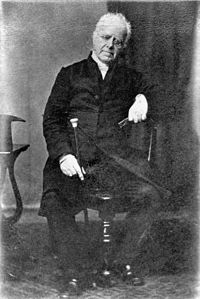Henry Williams
Henry Williams (11 February 1792 – 16 July 1867) was the leader of the Church Missionary Society (CMS) mission in Aotearoa (New Zealand) in the first half of the 19th century. He entered the navy at the age of fourteen and served in the Napoleonic Wars. He went to New Zealand in 1823 as a missionary. The Bay of Islands Māori gave Williams the nickname Karu-whā ("Four-eyes" as he wore spectacles). He was known more widely as Te Wiremu. ('Wiremu' being the Māori form of 'William'). His younger brother, William Williams, was also a missionary in New Zealand and known as "the scholar-surgeon". Their grandfather, the Reverend Thomas Williams (1725–1770), was a Congregational minister at the Independent Chapel of Gosport.Although Williams was not the first missionary in New Zealand – Thomas Kendall, John Gare Butler, John King and William Hall having come before him – he was "the first to make the mission a success, partly because the others had opened up the way, but largely because he was the only man brave enough, stubborn enough, and strong enough to keep going, no matter what the dangers, and no matter what enemies he made".In 1840 Williams translated the Treaty of Waitangi into the Māori language, with some help from his son Edward.In 1844, Williams was installed as Archdeacon of Waimate in the diocese centred on the Waimate Mission Station.
Personal facts

| Alias (AKA) | Te Wiremu and Karuwha |
|---|---|
| Birth date | February 11, 1792 |
| Birth place | |
| Date of death | July 16, 1867 |
| Place of death | |
| Spouse | |
| Relatives |